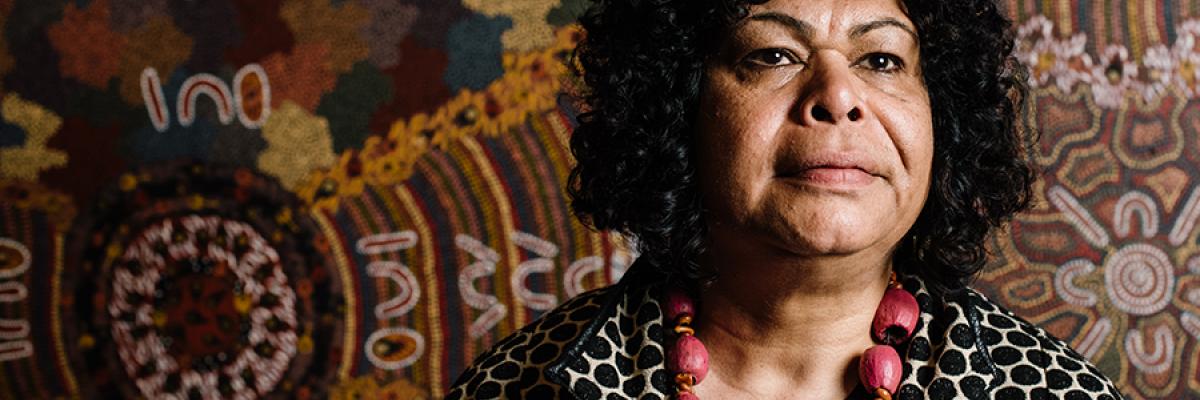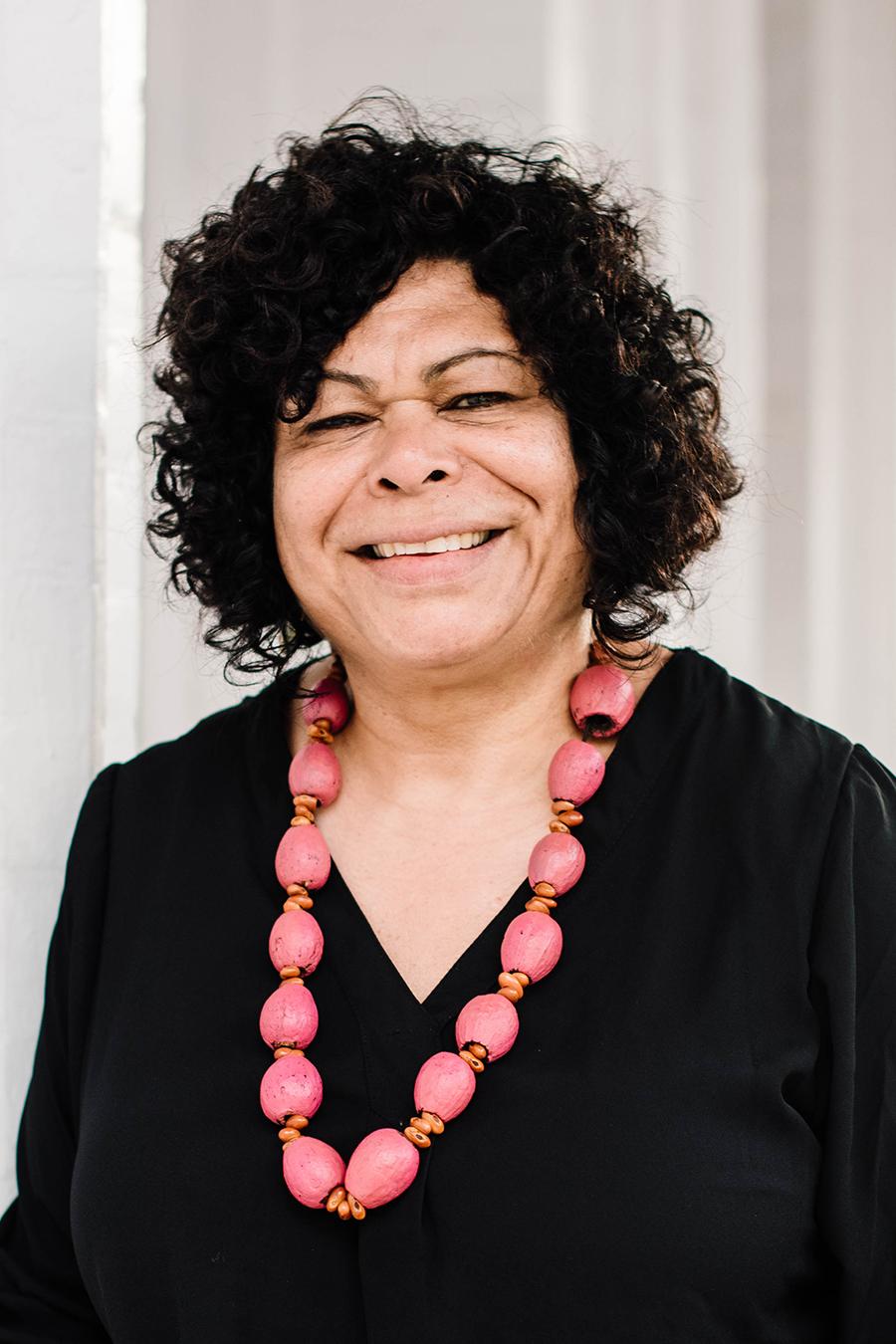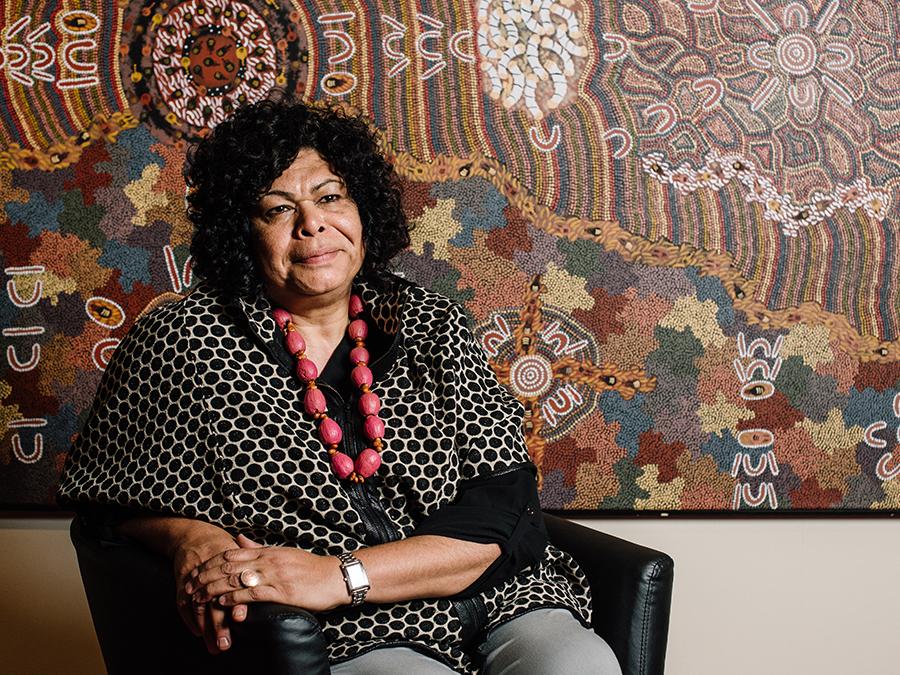Masters of their universe
The community leader giving Aboriginal people a voice at the policy table.

Andrea Mason OAM at Tandanya National Aboriginal Cultural Institute, in front of Bush Tucker Dreaming, artwork by Lily Napangardi Campbell
Change is possible, let us lead. That’s what Andrea Mason OAM, one of the most powerful and inspirational voices in the Aboriginal community stands by, passionate that First Nations people should lead the solutions to issues that impact them.
“We often don’t have the final say in matters that affect us, matters that benefit us and we want that to change,” said the woman who has devoted her life to Aboriginal justice.
“We want to be able to lead our own communities and our own organisations. We look at our own communities from the inside out and we see that things are possible.”
Through her fight for Aboriginal rights, her journey has spanned politics, public policy and practice where she has acted as a bridge between ancient culture and the 21st century corporate world.
“We want to be able to lead our own communities and our own organisations.”Andrea Mason
She is now ready to fight for those with a disability, having earlier this year been appointed as a Commissioner for the Royal Commission into Violence, Abuse, Neglect and Exploitation of People with a Disability. Andrea hopes her contribution will bring about positive change in First Nations communities.
“First Nations people with a disability are a marginalised group within a bigger marginalised group. There are a lot of similarities in the Aboriginal and Torres Strait Islander Rights Movement and the Disability Rights Movement,” she said.
“I have seen first-hand what a respectful model of care looks like for ‘high risk’ clients.
“I felt the strength of that experience could only assist me in my role as a Royal Commissioner.”
Andrea is a Ngaanyatjarra and Kronie Australian woman who grew up in Kalgoorlie, Western Australia. As a child, Andrea could see the importance of speaking up for Aboriginal and Torres Strait Islander rights.

“I feel very privileged that I was living in South Australia at a time when there was a significant push for Aboriginal people to do studies, which were designed to give us incredible tools and understanding to work not only in the public service, but in the Aboriginal and Torres Strait Islander services sector.”Andrea Mason OAM
“From a young age, I was surrounded by men and women helping other Aboriginal and Torres Strait Islander people and it left a very strong impression,” she said. Andrea moved to Adelaide in the 1980s. Over a period of time her interest in governance and policy led her to study law.
“I feel very privileged that I was living in South Australia at a time when there was a significant push for Aboriginal people to do studies, which were designed to give us incredible tools and understanding to work not only in the public service, but in the Aboriginal and Torres Strait Islander services sector,” she said.
Andrea’s career took her on a journey in public policy and practice, but it was in Canberra where she hoped she could really make a difference.
As the first ever Indigenous woman to lead an Australian political party (Family First), Andrea ran unsuccessfully for office in 2005.
“Having studied law, as well as public administration, and having spent ten years working in the public service and seeing the experience of the Aboriginal rights movement, I felt as someone who was living well in two worlds, I could bring a point of difference in conversations. I could draw from my own history and from the history of Aboriginal and Torres Strait Islander people. I felt that was an opportunity to take at that time, but that door did not open,” she said.

In 2008, Andrea began working at the Ngaanyatjarra, Pitjantjatjara and Yankunytjatjara (NPY) Women’s Council, an organisation governed and directed by Aboriginal women across 26 desert communities, spanning more than 350,000 square kilometres, traversing WA, SA and the NT. Here, Andrea was focused on conquering domestic violence, increasing employment and encouraging health and wellbeing for women in remote regions.
“There is an incredible level of hope and vision that sits at the heart of this women's organisation,” Andrea said. After ten years as the CEO of the NPY Women’s Council, Andrea made the tough decision to step down from the role to take up her role as a commissioner in the Disability Royal Commission.
Andrea says of the many challenges faced by Aboriginal and Torres Strait Islander communities, the need to be “supported to lead our own solutions in good law and good policy systems” is the one she feels most passionate about.
“Australia doesn’t exist, doesn’t have a soul or identity without its First Nations people,” she said.
“First Nations people governed this country and led a framework of peace, order and good governance before European contact.”
Looking back on her career, Andrea is exactly where she wants to be. A place where she hopes she will be able to inspire significant change.
Story by Renee Capps
Photos by Meaghan Coles
